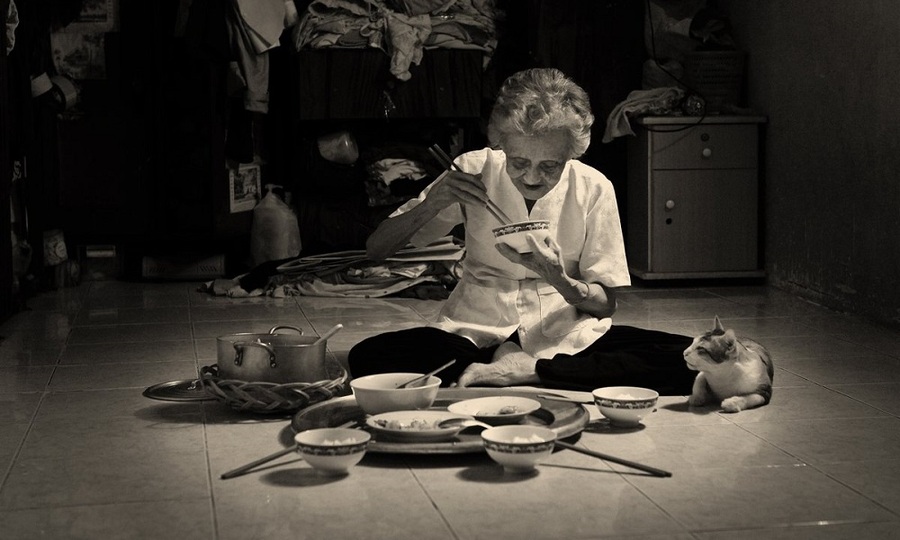How dangerous is brain atrophy in the elderly?
Brain atrophy is a natural part of the aging process. As people age, nerve cells also degenerate and gradually lose function, atrophy or die, causing brain tissue and brain size to gradually shrink, greatly affecting the ability to remember and language. , behavior…
Causes of cerebral atrophy
Cerebral atrophy has many causes, possibly due to genetics, age, nutrition (vitamin B12 deficiency also causes brain atrophy), lifestyle (high use of alcohol, drugs, etc.) leaves, frequent lack of sleep…), due to diseases of the vascular system that nourish the brain (such as carotid artery stenosis, vascular malformations or atherosclerosis).
In addition, there are a number of diseases that can cause brain atrophy such as: traumatic brain injury; stroke: cerebral hemorrhage, cerebral infarction (due to a sudden interruption of blood supply in the brain), regular use of corticosteroids; Alzheimer; Cerebral palsy, elderly people with dementia, dementia caused by atherosclerosis, encephalitis, infections of the brain or spinal cord, epilepsy…
Subjects at high risk of cerebral atrophy were previously mainly the elderly, but now the number of patients with brain atrophy in young people is increasing. The cause is often due to stress, prolonged work pressure, lack of sleep…
The danger of disease
Forgetfulness, confusion, difficulties in daily life… are common manifestations in the elderly. When the brain is atrophied, the ability to connect nerve cells is malfunctioning, the transmission of information from the brain to other parts of the body will be wrong, thus causing dysfunction. severe and lead to dementia, emotional disturbances, difficulty walking.
– Memory loss: is the first symptom and appears very early, is increasingly severe and irreversible. Patients often have short-term memory loss (forgetting new things that happened), gradually they forget the date, month, and the name of a loved one. When I leave the house, I forget my way home, forget to wash my face, forget to button my shirt, forget the face of my wife (or husband)…
– Language disorders: early manifestation, patients find it difficult to find words to express their ideas; Difficulty in pronunciation, not fluent in speaking, then gradually losing language ability.
In the advanced stage, the patient loses the ability to take care of himself. The patient has difficulty eating, has no control over his or her walking, and often wanders out of the house. Because of the loss of these controls, the risk of diseases such as:
+ Pneumonia: Because it is difficult to swallow food and drink, it is easy for patients to inhale these substances into the lungs, causing aspiration pneumonia.
+ Infection: because the patient often has urinary incontinence, a catheter must be placed, increasing the risk of urinary tract infection, if not treated, the disease will be more severe, possibly life-threatening. The pressure points, especially the back, bones, and sides are prone to sores due to paralysis of the whole body…
+ Falls and complications: patients are often disoriented and easily tripped, increasing the risk of fractures. Moreover, falls often cause severe head trauma such as intracranial hemorrhage, patients have to undergo surgery for a long time, and increase the risk of blood clots in the brain, skin ulcers due to lying positions…

Note when taking care of patients with cerebral atrophy
Cerebral atrophy is an incurable disease, so it can only slow down the development of the disease, but as the disease slowly develops, the patient also gradually appears the symptoms of the disease and gradually they will die. ability to take care of yourself. Therefore, the care of patients with cerebral atrophy needs a lot of attention.
In the case of patients with cerebral atrophy affecting motor ability: the mind is still very clear and awake, it is necessary to be meticulously cared for, ensuring respiratory circulation (helping the patient sit up, patting the back, sucking). and wipe away sputum if any); prevention of urinary tract infections (for patients to drink enough water, clean after urinating, ensure sterility of the means of urinary tract if catheters are required); Prevention of pressure sores (especially in the areas of the hamstrings, back of the sacrum, both sides, massage daily, avoid pressing pressure for too long in one place, rub talcum powder on places at risk of ulceration when detected early. ); provide adequate nutrition by parenteral routes, gastrointestinal tract, easy-to-digest foods, limit fat and sugar, a diet rich in vitamins and omega 3…
Disease prevention
To prevent brain atrophy, the following principles should be observed:
– Early detection and treatment of diseases such as atherosclerosis, hypertension, diabetes, dyslipidemia, obesity… These are diseases that promote cerebral ischemia leads to brain atrophy.
– Reasonable living regimen, get enough sleep, limit staying up late, limit smoking, beer, alcohol, carbonated drinks.
– Regular brain work in the form of learning such as learning foreign languages or studying languages, history, ornamental plants… are very good forms to help the brain function regularly, slow down brain atrophy process.
– Regular exercise: jogging, walking, climbing stairs, cycling, nursing or yoga suitable for age, helps blood circulation, nutrients to the brain in a better way. Healthy brain tissue enhances disease resistance.
– Reduce stress: because if the mind is always stressed, too much pressure continuously will cause the brain to become confused and make memory decline.
– Nutrition: Nutrition plays an important role in strengthening the body’s physical strength and resistance; limit foods that are too greasy; increase the use of foods rich in vitamins such as cereals, nuts, green vegetables, eggs, chicken…; calcium-rich foods such as seafood, soybeans, cauliflower, sea fish, almonds…
Isotonix® Daily Essentials Kit is essential for people with symptoms of brain atrophy













